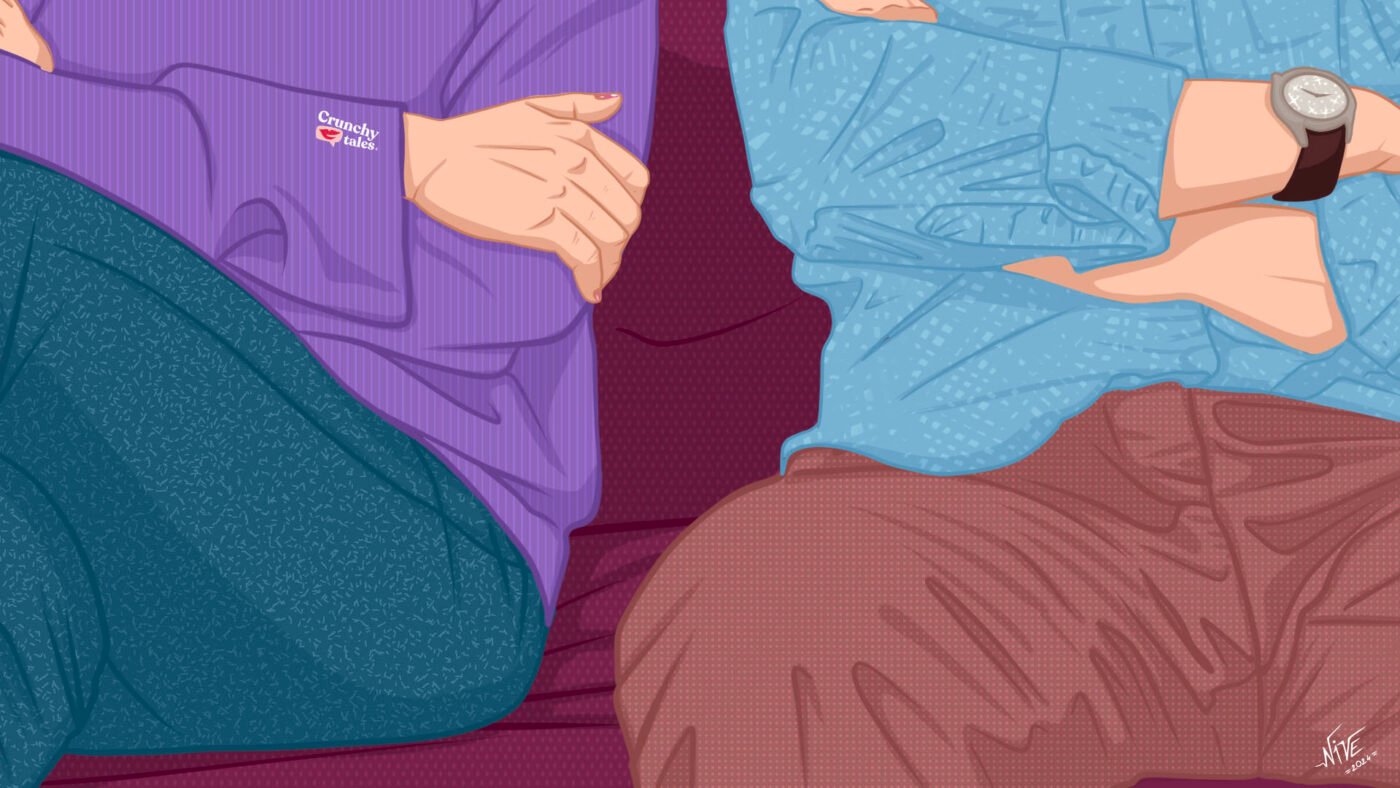Decoding Your Husband’s Midlife Crisis: It’s Not Just About the Red Sports Car (and How to Help)
A midlife crisis can feel like a hurricane hitting your marriage. But guess what? Sometimes women (and the menopause rage) are not the only ones to be blamed. Dealing with restlessness, irritability, or outlandish purchases is also related to men. While some husbands might experience a period of impulsive behaviour, a midlife crisis is often more nuanced than stereotype portrays. It’s a time of reflection and reevaluation, prompting men to question their path and purpose.
We’ve asked Bradley Richardson, best-selling author, speaker and founder of “Advanced Adulting“, where he coaches and creates content to help “grown ass” adults navigate the shifts and changes of midlife, to cast a light on men’s midlife crisis and for once, help us put ourselves into men’s shoes in order to survive the storm.
There are many parallels between men’s midlife crisis and women’s going through menopause. Not the physical aspects, of course, but the fact that there are phases in people’s lives that are highly personal journeys and experiences that can impact people around them sooner or later, too.
I was having a similar conversation about this earlier this week with my partner who is menopausal. It continues to amaze me at the depth of what men and women do not know about each other from a simple developmental and physiological aspect. It’s also safe to say it’s amazing how little we know about ourselves, too.
Understanding, awareness, acceptance, and recognizing that it’s an individual journey for the other person is huge and this goes both ways for men and women. And yet, all too often in both cases of dealing with a menopausal partner or one going through a “midlife crisis”, the other person (spouse) feels it’s about them.
Thoughts like “I’m unattractive, they don’t want me, they want something or someone else, etc.” might suddenly come up to women’s minds but, while in some cases that’s true, the reality is that for many men there are so many things going on behind the scenes or in their heads, that no one ever sees or hears, least of all their spouse, that it has nothing to do with her personality, sex, or attraction.
It’s internal, much bigger, and much darker.
What a man’s midlife crisis really is VS what many people suppose it is
Let’s start by talking about what many people still consider to be a –midlife crisis– especially as it relates to men.
Many believe it revolves around the idea of chasing youth, getting a yellow Corvette, having an affair, and leaving our partner for a younger woman, but generally, when you talk to men and get them to really open up about what’s going on in their lives, it couldn’t be further from what’s going on inside their head.
You can’t paint a midlife crisis with a broad brush or claim that men want to throw away responsibility, be free in some sort of delayed adolescence, or “Peter Pan syndrome“. Yes, that is how sometimes some men choose to react to this phase of life (though that behaviour is a way to avoid looking at what’s going on inside) blowing up their own world, the ones they love for a temporary fix and never looking at the cause.
But contrary to societal assumptions, that’s not how most men handle their midlife crisis. It’s much quieter, darker, and equally destructive. They keep it inside and nobody ever knows what’s going on. Depression and suicide among middle-aged men are at record levels. As are mental health issues, alcoholism, or drug abuse.
Clearly, there is something going on inside them bigger than what you see from the outside.
Sometimes, they become a shell of themselves. There is a lack of desire for you, for their job, for life. They simply give up and suffer in silence until they check out. They and those around them ultimately pay the price.
On the other hand, there are also men who take this time as a period of reflection and evaluation that can also be driven by or result in a crisis. A crisis of confidence, a mental or emotional one, a crisis in how their actions impact others.
Personally, I don’t buy into those who use euphemisms (enter chrysalis) to portray this critical phase of life denying that it exists or refusing to call it what it is. Yes, it can result in a positive outcome such as awakening or reinvention, but sometimes you have to go through hell to get there.
How does a man’s midlife crisis happen and why does it occur?
Every man is different but several common issues can contribute to this period of crisis or reflection. For some of them, it’s the first time they realize they can’t or aren’t able to do what they once could. They question their competence, their confidence and relevance.
As men are incredibly competitive, purpose and achievement-driven, they start questioning their competence, their confidence and relevance. We’ve been raised this way and for better or worse we place a lot of self-esteem and worth in these things.
At midlife, they often look at whether they’ve met expectations. Their own, societies, families, spouses, and work. We are provers. We want to prove what we are capable of to ourselves, to the world and to the woman we love and sometimes, when we have the perception of becoming the man who has gone from being the one she chose, to the man who can’t do anything right, it’s quite tough.
It’s a direct blow to the ego and perception of ourselves. How we are, how we want to be, how others see us. It’s not so uncommon for there to be a feeling of “I want to feel relevant and competent again.” When we are not able to articulate that or define what it means at this stage of life, then we run, grasp, or retreat. Some curl up, some lash out or deflect and hide behind things, some crawl in a bottle.
And God forbid they ask for help.
But it’s not help per se that they are looking for, rather it’s an acceptance and understanding that it’s normal to evaluate these things. And let’s get out of our heads and get beyond feelings for a second: the financial pressures are very real and I can’t tell you the number of men whose crisis (and even suicide in a few cases I know) dealt around their ability or inability to provide adequately, or by their or their spouse’s expectations. And nobody knew until it was too late.
For the first time, many men not only look inward but also at their surroundings and where they fit, starting to consider their mortality.
We realize that we can’t do what we used to or we fail or come up short for the first time. We realize that perhaps we came up short on our own dreams, achievements, or potential as an earner, provider, husband, or father.
We look at our parents, their absence, and shortcomings and wonder if we are becoming like our fathers. We are lonely (It’s well-researched that men have significantly fewer friends than women ) and golfing buddies don’t equate to “real friends” whom you can open up to.
The Andropause crisis
Believe it or not, as women are dealing with menopause, their bodies and emotions, men too are experiencing an evil Puberty 2.0 of their own. Andropause is real. Low testosterone, weight gain, inability to add muscle, you pee 5 times a night and it takes you 5 minutes each time because your prostate is the size of a golf ball.
You know, it’s not that he isn’t attracted to you or doesn’t desire you anymore. It’s the simple fact that he knows that things aren’t going to work like they once did (if they work at all) and this is embarrassing and emasculating. We never talk about it and sure as hell we don’t want to talk about it with our wives.
We don’t want to let our women down (certainly not in the bedroom) and so many men avoid discussing it or avoiding having it. We shame ourselves or in some cases are made to feel ashamed about it.
Shame is a killer (regardless of where it comes from and whether it is sexual, financial, etc.) and drives some men to clam up, lash out, or run.
How To Help Your Husband
There is no two-step formulaic fix. Time and willingness to acknowledge, reflect, and do the work help, but again this is a personal experience and struggle. But as a couple conversation and understanding can go a long way for both and show value for the individual and the union you have together.
How to help your husband? Through communication, awareness, and acceptance. Of course, that doesn’t mean accepting bad behaviour and it certainly doesn’t mean saying, “You need help“.
Encourage your husband to talk about what’s bothering him, listen actively without judgment, and try to see things from his perspective might be a key. Instead of accusatory statements, use “I” statements to express how his behaviour is affecting you.
Also, be open to change. Your husband might express a desire to pursue a neglected passion or make a career shift. Be supportive within reason, and explore ways you can participate in his newfound interests.
Not to oversimplify, but a non-judgmental environment and space to explore what’s going on internally, physically, and emotionally go a long way to supporting your partner and your relationship. Of course, it goes both ways and being able to have those conversations to understand each other, to understand and accept that your two individuals that make up the union, is crucial. And yet, to make the union work each individual must be working properly.
Conclusion
Remember, a midlife crisis can be an opportunity for growth, both individually and as a couple. By offering support, open communication, and a willingness to explore change, you can help your husband navigate this challenging phase and emerge stronger together.
Like this post? Support Us or Sign up to our newsletter to get more articles like this delivered straight to your inbox!





